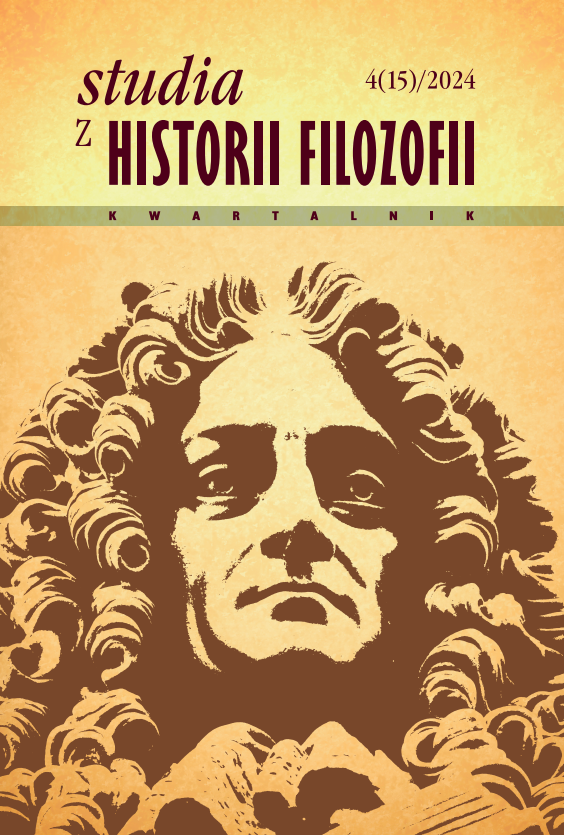Kryzys w kulturze, wartości estetyczne i teatralizacja życia politycznego według Hannah Arendt
DOI:
https://doi.org/10.12775/szhf.2024.021Keywords
judging, the understanding, reason, common sense, the beauty, the sublimeAbstract
The text concerns the issue of aesthetic values in Hannah Arendt’s Lectures of Kant’s Political Philosophy. Arendt considered the power of judgement a political ability. Her diagnosis of the state of crisis in European culture is the background for this statement. Her response to this is the postulate to develop our power of judgement as the basis of political community. This is possible thanks to a number of similarities between political activity and fine art. The problem is that Arendt, in her reflections on beauty as a political value, got entangled in contradictions and treated Kant’s Critique with carelessness. One of them, discussed in this essay, was the failure to take into account the importance of the sublime as an aesthetic value of key importance for politics and judgements about it. If politics were considered through the concept of the sublime, most problems the reader can find in Arendt’s Lectures would disappear, especially thenegligence of moral dimension of Kant’s political philosophy. Moreover, Arendt’s remarks concerning mass culture, expressed in the text The Crisis in Culture, seem to be fundamentally inaccurate. Taking into account Kant's concept of the sublime allows a more correct recognition ofmass culture, its functioning and critical potential.
References
Arendt Hannah. 1961. „The Crisis in Culture. Its Social and Its Political Significance”. W: Between Past and Future. Six Exercises in Political Thought. New York: The Viking Press.
Arendt Hannah. 1992. Lectures on Kant’s Political Philosophy. Chicago: The University of Chicago Press.
Arendt Hannah. 2003. O rewolucji, przeł. Mieczysław Godyń. Warszawa: Czytelnik.
Arendt Hannah. 2010. Kondycja ludzka, przeł. Anna Łagodzka. Warszawa: Aletheia.
Arendt Hannah. 2011. „O kryzysie w kulturze i jego społecznej oraz politycznej doniosłości”, przeł. Mieczysław Godyń, Wojciech Madej. W: Hannah Arendt, Między czasem minionym a przyszłym, 235–272. Warszawa: Aletheia.
Arendt Hannah. 2012. Wykłady o filozofii politycznej Kanta, przeł. Rafał Kluczyński, Marcin Moskalewicz. Warszawa: Kronos.
Arendt Hannah. 2023. „Kultura i polityka”, przeł. Jerzy Korpanty. W: Myślenie bez poręczy. Eseje o rozumieniu świata, 217–245. Kraków: Wydawnictwo Vis-à-vis Etiuda.
Baudrillard Jean. 2007. Wymiana symboliczna i śmierć, przeł. Sławomir Królak. Warszawa: Wydawnictwo Sic! s.c.
Beiner Roland. 1992. „Hannah Arendt on Judging”. W: Arendt Hannah, Lectures on Kant’s Political Philosophy, 89–156. Chicago: The University of Chicago Press.
Benjamin Walter. 1996. „Dzieło sztuki w dobie reprodukcji technicznej”, przeł. Hubert Orłowski. W: Benjamin Walter, Anioł historii. Eseje, szkice, fragmenty, 201-241. Poznań: Wydawnictwo Poznańskie.
Benjamin Walter. 1996. „Mała historia fotografii”, przeł. Hubert Orłowski. W: Benjamin Walter, Anioł historii. Eseje, szkice, fragmenty, 105–125. Poznań: Wydawnictwo Poznańskie.
Blumenthal-Barby Martin. 2023. Arendt, Kant, and the Enigma of Judgment. Evanston, Illinois: Northwestern University Press.
Canovan Margaret. 1978. „The Contradictions of Hannah Arendt’s Political Thought”. Political Theory 6(1): 5–26.
Canovan Margaret. 1983. „Arendt, Rousseau, and Human Plurality in Politics”. The Journal of Politics 45(2): 286–302.
Canovan Margaret. 1992. Hannah Arendt – A Reinterpretation of Her Political Thought. New York: Cambridge University Press.
Dossa Shiraz. 1989. The Public Realm and the Public Self. The Political Theory of Hannah Arendt. Waterloo, Ontario, Canada: Wilfrid Lautier University Press.
Foucault Michel. 2020. „Troska o siebie”, przeł. Tadeusz Komendant. W: Historia seksualności, t. 3. Gdańsk: Słowo/obraz terytoria.
Habermas Jürgen. 1977. „Hannah Arendt’s Communication Concept of Power”. Social Research 44: 3–24.
Hegel Georg Wilhelm Friedrich. 1958. Wykłady z filozofii dziejów, przeł. Janusz Grabowski, Adam Landman. Warszawa: PWN.
Josefson Jim. 2019. Hannah Arendt’s Aesthetic Politics. Springer International Publishing: Palgrave Macmillan.
Kant Immanuel. 1986. Krytyka czystego rozumu, przeł. Roman Ingarden. Warszawa: PWN.
Kant Immanuel. 2004. Krytyka praktycznego rozumu, przeł. Jerzy Gałecki. Warszawa: Wydawnictwo Naukowe PWN.
Kant Immanuel. 2004. Krytyka władzy sądzenia, przeł. Jerzy Gałecki. Warszawa: Wydawnictwo Naukowe PWN.
Kant Immanuel. 2011. „Spór fakultetów”, przeł. Mirosław Żelazny. W: Immanuel Kant, Dzieła zebrane, t. 5, 195–284. Toruń: Wydawnictwo Naukowe UMK.
Kant Immanuel. 2012. „Ku wiecznemu pokojowi”, przeł. Mirosław Żelazny. W: Dzieła zebrane, t. 6: Pisma po roku 1781, 331–375. Toruń: Wydawnictwo Naukowe UMK.
Lyotard Jean-François. 1994. Lessons on the Analytic of the Sublime, przeł. Elizabeth Rottenberg. Stanford, California: Stanford University Press.
Moskalewicz Marcin. 2013. Totalitaryzm, narracja, tożsamość. Filozofia historii Hannah Arendt. Toruń: Wydawnictwo Naukowe UMK.
Nowak Piotr. 2018. Przemoc i słowa. W kręgu filozofii politycznej Hannah Arendt. Warszawa: Biblioteka Kwartalnika Kronos.
Sjöholm Cecilia. 2015. Doing Aesthetics with Arendt: How to See Things. New York: Columbia University Press.
Downloads
Published
How to Cite
Issue
Section
License

This work is licensed under a Creative Commons Attribution-NoDerivatives 4.0 International License.
Stats
Number of views and downloads: 339
Number of citations: 0



